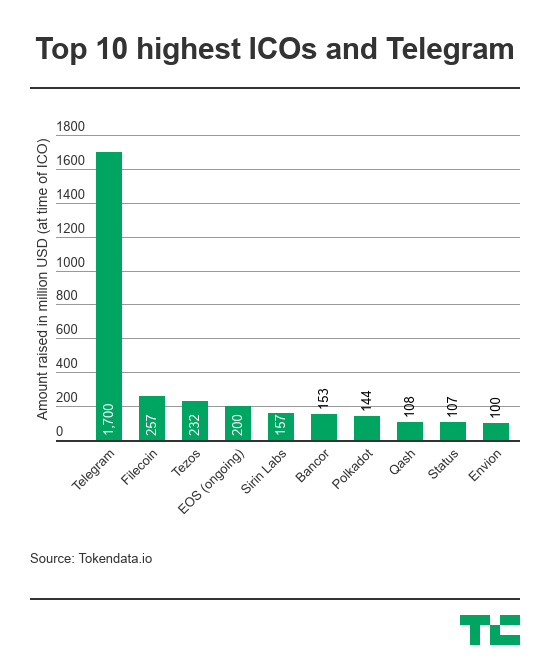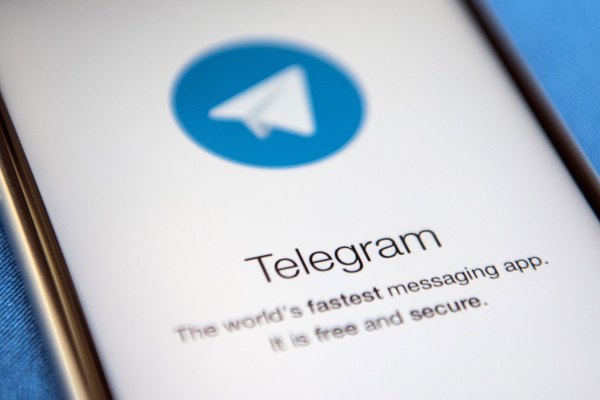Telegram’s ICO was supposed to be a record-breaker to develop a platform that brings the decentralized internet to life. Instead, it has become a mess with the tightly controlled fundraising process in disarray as early backers sell their tokens for handsome returns.
The company recently canceled the public sale piece of its ICO, the Wall Street Journal reported this week, after it raised $1.7 billion from private sale investors, according to SEC filings. But the issues date back further.
Telegram’s grand vision is to build the TON (Telegram Open Network), a blockchain-based platform that extends its messaging app, which counts 200 million active users, into a range of services that include payments, file storage, censorship-proof browsing and decentralized apps hosted on the platform. According to the original whitepaper, the plan was to raise $1.2 billion using both invite-only private investors and an open sale to the public.
Telegram later extended the raise to $1.7 billion before it canceled the public sale altogether. That’s almost certainly because it had already raised enough money to develop TON without the risk of running into the SEC’s ongoing ICO probe by soliciting money from the public.
The result is that the ordinary people can’t buy Telegram’s Gram crypto token until it is released on exchanges. There’s currently no timeline for that. But, with massive demand for the messaging app and deep discounts for early backers, a secondary market for buying and selling tokens early has emerged — with huge returns already realized by some.
One source said an early investor who acquired a tranche of tokens at a price of $0.37 is actively seeking to sell for $1.30 — potentially a 3.5-fold increase for a token that hasn’t left the gate yet. TechCrunch understands many others deals have been closed at different rates but other middlemen are sliding in to profit, too. A number of ‘brokerages’ have moved in on the opportunity to connect sellers and buyers for a fee.
That’s just some of the examples of unofficial deals that are flowing as early backers who got Gram tokens cash in on demand, which has only increased following the cancellation of the public sale. Added to that, discounts of up to 50 percent on the token price have made it easy to return a big multiple.
Given the cooling off of the price of bitcoin, Ethereum and other cryptocurrencies this year, a three-fold return with no risk is not to be sniffed at.
Another source told TechCrunch that Telegram is aware of the unofficial sales but, since they do not violate any laws — because ICOs are not regulated — there is nothing that it can do but watch. The issue with early sales is that the market can influence, or even set, the price of a token through unofficial deals which could complicate listing it on exchanges or setting a post-ICO price.
Added to that, the fact that Telegram isn’t in control of the flow of capital at this early stage doesn’t look good.
The Telegram ICO has already raised considerably more than any other project to date — the nearest being Filecoin’s $250 million-plus ICO — but it has not set a shining example.

Looking beyond the messy sales process, the project has been heavily criticized for ambiguity. Pantera Capital’s Charles Noyes called it “opportunistic” with a white paper that is “essentially a wishlist of things they want to have, and how it will work assuming that their wishlist doesn’t crash and burn.” MIT Technology Review called it “bold but short on ideas,” while others have pointed out that much of the technical theory laid out in the document is recycled from other projects.
Telegram’s immediate challenges go beyond the ICO at this point. The Russian government has gone after the messaging app through crude censorship campaign that knocked out swathes of IP addresses — potentially as many as 19 million — in order to prevent Telegram evading its crackdown. That hammer-headed approach also knocked out services like Twitch, Slack, Soundcloud, Viber, Spotify, Fifa, Nintendo in the process.
TechCrunch contacted Telegram CEO Pavel Durov for comment but we had not heard back at the time of writing.
Disclosure: Jon Russell owns small amounts of cryptocurrency.
